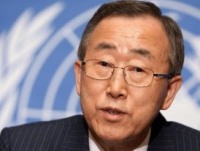UN releases blueprint for 'green' economic growth


The United Nations Environment Programme (UNEP) today announced that it had drafted a blueprint for transitioning the world to a greener future while preserving – and potentially even accelerating – predicted economic growth.
The UPEP report, Towards a Green Economy: Pathways to Sustainable Development and Poverty Eradication, called for investing $1.3 trillion a year (approximately 2 percent of yearly world GDP) into ten key sectors: agriculture, buildings, energy, fisheries, forestry, industry, tourism, transport, waste, and water.
Governments already spend between 1-2 percent of subsidizing fossil fuels and unsustainable fisheries, the report notes. The UN believes that trillions of dollars in private capital will follow public investments.
"The sum, currently amounting to an average of around $1.3 trillion a year and backed by forward-looking national and international policies, would grow the global economy at around the same rate if not higher than those forecast, under current economic models," according to the UNEP.
The report cited multiple examples of how “green” initiatives can effectively fight poverty in the developing world. A water conservation and land development program in India generated three billion working days worth of employment in rural India, for example.
In another example, the UNEP forecasts that redirecting just one tenth of a percent of world GDP to areas affected by water-borne diseases would yield dramatically less water consumption while also providing improved sanitation.
The report estimates that water-borne diseases drain two percent of combined GDP from Cambodia, Indonesia, the Philippines, and Vietnam.
There is mounting evidence that “green” initiatives can indeed propel economic growth, despite aggressive rhetoric to the contrary.
Former U.S. President Bill Clinton devoted some of his keynote address at the Feb. 18 RSA information security conference in San Francisco to highlight how countries that have established a new energy strategy in response to the Kyoto Treaty now have lower unemployment rates, according to blogger Mary Vincent.
The UNEP stated that its plan would also forestall the worsening “risks, shocks, scarcities and crises increasingly inherent in the existing, resource-depleting, high carbon 'brown' economy.”
Further economic growth is necessary to support an estimated world population of nearly 9 billion by 2050, UNEP executive director Achim Steiner said in a statement.
"But this development cannot come at the expense of the very life support systems on land, in the oceans or in our atmosphere.”
This post was originally published on Smartplanet.com